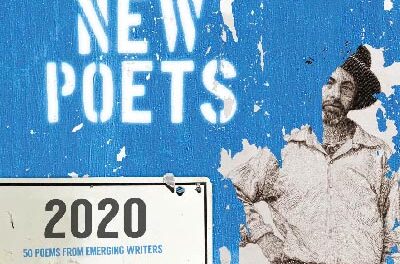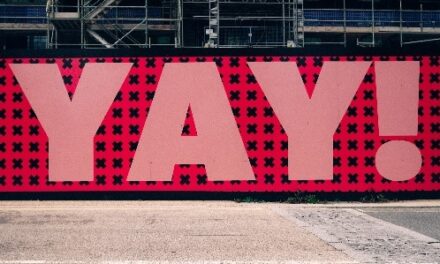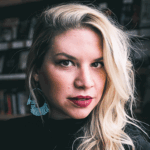We’re very sorry to announce the death of one of our contributors, Naira Kuzmich, whose essay “Dances for Armenian Women” appeared in Issue 13.2 about this time last year. (Read an excerpt below.) Naira was born in Armenia and raised in the Los Angeles enclave of Little Armenia. Her fiction and nonfiction appeared in journals such as the Threepenny Review, Massachusetts Review, Ecotone, SmokeLong Quarterly, West Branch, Salamander, Blackbird, The Rumpus, and Guernica, as well as in our pages, and her story “The Kingsley Drive Chorus” was chosen for The O. Henry Prize Stories 2015. She was 29 when she passed away last week, from lung cancer. Our deepest sympathies to her friends and family.
You can read interviews with her here or here, and in her memory, here’s the first section of her essay from our pages:
From “Dances for Armenian Women”
1.
She is not named after a queen. She is not one of many born with crowns on their heads, those precious metals. Ornaments. Those heavy badges of honor. She is the culmination of all those women, the part of a flower just above and below the dirt from which everything branches, and then breathes. This is what I mean by crown: the end and the beginning. The child’s head before she is pulled from the root. The child becoming visible from the depths of her mother’s darkness. She is the Word, and not one example of it. Epitome, meaning both in addition and to cut. Epi and temnein. Two in one. What perfection in the abstract. I have plenty of definitions. I am just full of meaning. My mother, Tagui, three syllables, three distinct sounds in one expression. Two and one. If God is the Father, the Son, and the Holy Spirit, then you must believe in my magic, too: this essay is not just about her.
After years apart from the place where she was born, she returned, thinking the only thing that had changed was the name of that city. In 1991, a Union had dissolved. In 2006, a mother brought along a daughter to prove her existence. When she walked down the streets, she did not cry out, I am here, I am here, but let’s consider each smile at those walking by, each wretched note escaping her throat, a bird begging to sing. To sing, I said. Let’s remember how not one of her neighbors met her eye. Let’s remember them meeting mine. What was it her old neighbor said? She had slowed down to stare. The white streaks in her hair, the smudge of red lipstick on her cheeks, not rubbed in. I had smiled at her because it was my turn to smile. I followed her hand as it moved to touch my arm, but then it changed direction, and oh, how I missed that touch like it was mine to miss! I’m telling you now that it was. That if I could go back, I would grab her fingers between mine. I watched, instead, the woman’s hand reach for the other, for her own. I’m sorry, she said. You look like someone I once knew.
As a little girl, my mother would sit on her father’s knee. She grew taller and continued sitting. My grandfather welcomed her new heaviness, at ten, at twenty, at thirty and forty. When he was disappearing, it was my mother’s weight on his knees that kept him visible. In the final years of his life, she’d sit on the sunken arm of the sofa where he’d be resting, and she’d drape her legs over what she could. No. Not drape. Hover. She floated her legs, afraid. Her weight lingered in the air. In that space, my heart exploded. From the floor I would watch them. My father would watch from the door, hand curled around the knob. And she let us. Just watch, she was saying. Just you wait. This is how I learned to love.
She only considered leaving once. By consider, I do not mean thoughts, or dreams. I mean not looking your child in the eye and going down the stairs. Hours later, she was back. What happened? Where did she go? I have never asked. Only know that when the door opened, she exhaled and I inhaled. To be a daughter means this: to take and take and take what she is willing to part with, air, socks, earrings, to take and take and take until it was never hers to begin with, pictures, stories, memories, to take and take and take until she’s left with nothing and you everything. You will carry it, everything she has spent years carrying. You will bear her everything in your womb until you, too, can one day pass it on.
Sometimes she just wants to sit in front of the television and close her eyes. Sometimes she cleans, finds things to clean. Sometimes she fights for what she wants. She has raised her voice only at her children. My sister and I used to quarrel over who would get to brush her long hair with our fingers. My mother purred under us, under our hands. Purred, I said. I was eight or nine when she asked me to come into the bedroom. Young. I remember her hair was parted to the right. Her hair long and thick, a cascade of dark waves swelling wildly over her breast and into her waist, thinning out at the edges over her hips. She gave me my father’s camera and told me to take a picture and I pressed down without thinking. Flash. My mother taking the kitchen scissors to her hair, snapping it off as she would chicken bones or celery stalks for dinner, her eyes tightly shut, her face turned away from the sight and sound. That may have been me. May have been? No, no, that was.
Growing up, the most affectionate I had seen my parents was when they’d slow dance at family weddings. A Russian song, and she would look at him in this shy way, her mascaraed eyelashes making her almond eyes look heavy, hopeful. She’d nudge his hand with her wine glass, tapping it with her long fingers. If my dad had had a couple of shots, he’d initiate the dance himself, with a brisk nod of the head. She never refused. If my father wanted to, he could’ve brought up his hand from her waist to touch the small of her back. He could’ve held her more firmly, his palm drawing her closer to smell the faint trace of her perfume—she always used so little. Just a touch, she’d say, that’s all I need. But it took him years. My mother knew how to wait, and oh, how I’m grateful. Oh, how they’re finally close to happy.
. . .
Read the rest of the essay in Issue 13.2, available only in digital (e-book) form, for $5, at our online store, under “Digital Issues and Subscriptions.”











